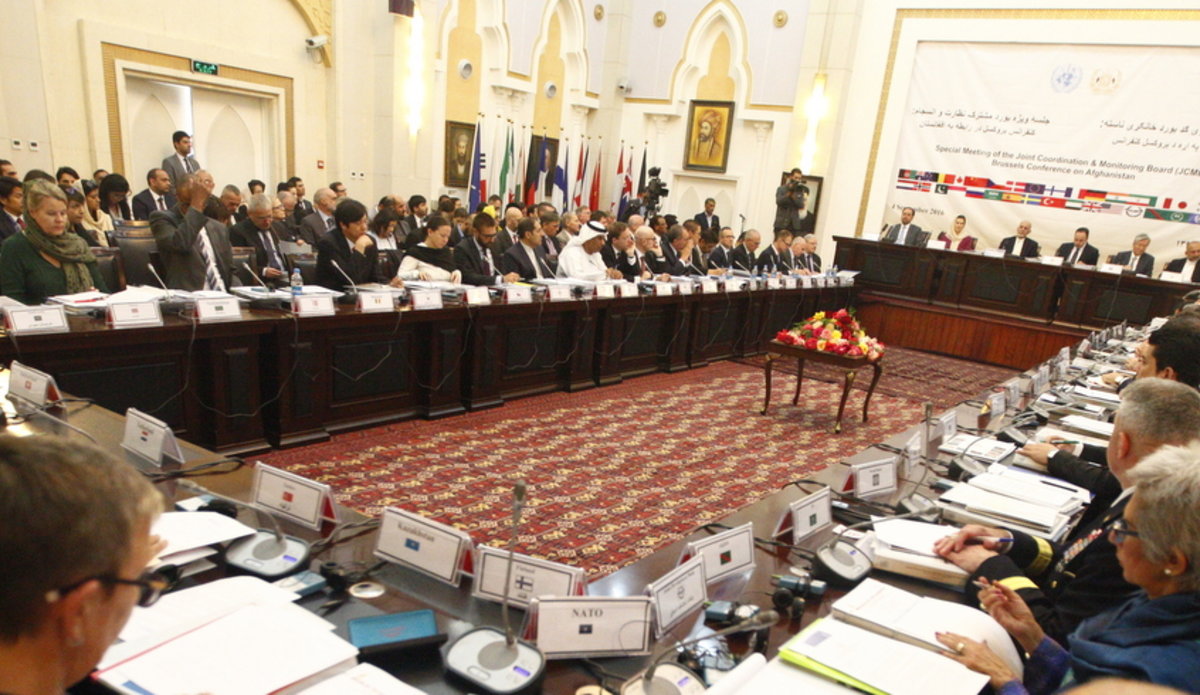Afghan Government and partners review preparations one month out from key Brussels Conference
KABUL - To review preparations one month ahead of a major international conference on Afghanistan, diplomats, international organizations, civil society and the private sector met today at the Presidential Palace with senior leaders of the Afghan Government.
The meeting, a special session of the Joint Coordination and Monitoring Board, was co-chaired by H.E. Minister of Finance Eklil Hakimi and the UN Secretary-General’s Special Representative for Afghanistan, Tadamichi Yamamoto.
In his opening remarks, President Ghani said: “Today you will be hearing from our government about how the reform agenda that we presented in London in December of 2014 is turning into practical actions that are beginning to change the lives of our people.
The Afghan National Peace and Development Framework (ANPDF), the President said, defines the challenge as one of overcoming institutional fragmentation.
“Our government is meeting its commitments to the international community to fight corruption, to improve gender equity, and to advance on the road toward self-reliance through economic growth,” he stressed. “Our country needs to see and hear that its Government is uniting around the causes of justice for the poor and education for its children.”
The Brussels Conference -- at which new development assistance pledges for 2017-2020 are to be made -- will be co-hosted by the Government of Afghanistan and the European Union on 4 and 5 October 2016 in Brussels. It follows on from the London Conference held in 2014 and the last Senior Officials Meeting (SOM) held in Kabul in September 2015.
Minister Hakimi, echoing the President, said that the theme of the meeting is self-reliance.
“As we look forward to the Brussels Conference, our task here today is to show what we intend to do to keep Afghanistan steady on the road to self-reliance,” he said. “The ANPDF sets the state for the next steps in our journey towards self-reliance. It’s a goal I know we all share.”
Led by Minister of Finance Hakimi and H.E. Minister of Economy, a panel presented the Government’s new development strategy to the assembled participants. In addition, Minister of Labour, Social Affairs, Martyred and the Disabled, Nasrin Oryakhil, spoke about the Government’s plans for promoting economic empowerment for women, and Minister of Commerce and Industry Homayoun Rasa, Minister of Energy and Water Ali Ahmad Osmani, and Presidential Advisor Dr. Homayoun Qayoumi described the Government’s plans to build the country’s infrastructure.
Noting that competition for development resources is increasing around the world, UN envoy Yamamoto called on international partners to sustain their support for Afghanistan, and described the Government’s plans as “essential tools,” that will “serve both to attract support from donors at the upcoming Brussels Conference on Afghanistan and to guide how that support is used to benefit the Afghan people.”
Stefano Manservisi, Director-General for International Cooperation and Development of the European Commission, said: “The European Union looks forward to welcoming the Afghan Government and representatives from around 100 countries and international organisations. The Union is firmly committed to a long-term partnership with Afghanistan.”
“The EU is determined to support Afghanistan in its reform and state-building efforts to ensure citizens' democratic rights, and access to basic services such as education, health, food and jobs. The Afghan reform agenda, a new development partnership, and a new regional dynamic are key elements for the Brussels conference, which I am confident will signal a renewed and stronger partnership based on mutual commitments and mutual accountability,” said Mr. Manservisi.
In closing remarks, Afghanistan’s Chief Executive, Abdullah Abdullah, said the new development framework builds up on Tokyo’s self-reliance vision and presents a statement of how the National Unity Government will achieve its goals of moving toward self-reliance and increasing the welfare of Afghans.
“Have no doubt that both the President and I are committed to a practical reform agenda that aims to help our nation move forward,” said the Chief Executive. “Afghanistan has to seek its best political reform path, based on our national realities and needs.”
The Afghan Government and the international community agreed to establish a Joint Coordination and Monitoring Board (JCMB) for overall strategic coordination of the implementation of the Afghanistan Compact at the London Conference (January 2006) and in United Nations Security Council Resolution No.1659.
 UN
UN







